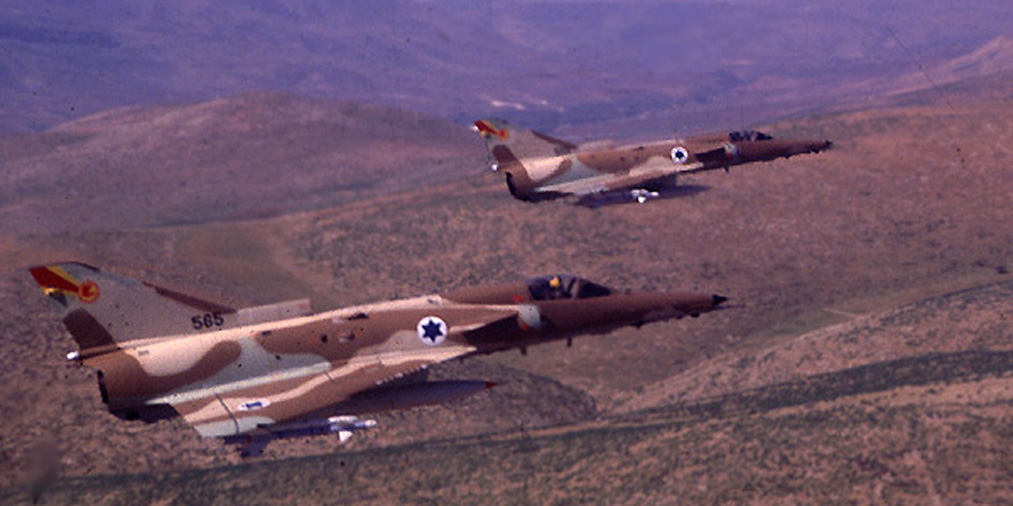
Israel was endangered with a war ever since independence back in 1948. Being surrounded by Arab states and without big population, could not afford large ground troops, who would arise fear among even the strongest enemies. Yet awareness of difficult relations between Arabs and Jews could not allowed Israel having that minor army. The solely solution was investment onto air power, that by fast and well organized attacks would be able to inflict great damage in the short period of time. So in 1948 Israel created Air Force in order to support ground troops of the Israel Defense Force.
Nowadays formally known as the Israel Air and Space Force (IASF)—has accumulated a vast amount of battle experience in its six plus decades of existence. It participated in wars against adversaries in the Arab world: the 1948‒49 War of Independence, the 1956 Sinai Campaign, the 1967 Six-Day War, the 1969‒70 War of Attrition, the 1973 Yom Kippur War, and the 1982 Lebanon War. The competitiveness of their Air Force was truly firstly checked in 1967 and 1973 wars, where Israeli were forced to fight against 3 Arabs countries at once. Thanks to its effectiveness Israel managed to win both of this conflicts. Although it suffer great damages in the second war, which was a major blow to the armed forces.
Nevertheless, Israel Air Force played a major role in the both conflicts. Even though, it was the conventional war, meaning the only matter that counts is the conquest of the territory (which of course cannot be done by aircrafts, but only by ground forces), Israel’s planes damaged greatly Arab forces, enabling Israel Defense Force to capture certain areas. Due to the difference between these two wars, I shall discuss the role of air power separately.
1967 – Six-Day War
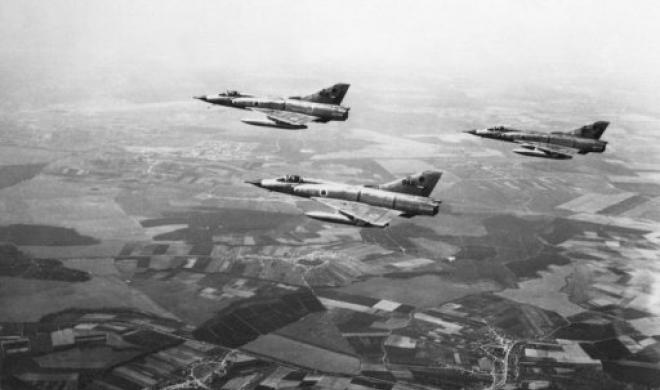
The war of 1967, among many considered as one of the most prominent victories in the second half of the 20th century, depicted how the war could be waged by the air power. As Egypt and Israeli relations were tensed, following the Nasser decision of moving the troops into Sinai, 5th June 1967 Moshe Dayan, Israeli Minister of Defense, unleashed deadly Dassault Mirage IIIC’s and Dassault Super Mystère’s modern aircrafts, which with the rest of IAF planes bombarded the unaware Egyptian, Syrian and Jordanian troops. Eventually, it allowed the ground units to conquer Sinai.
The Air power played a major role in Israel victory in the “Six Day War”, and thanks to its effort capture Sinai, Golan Height, West Bank, Eastern Jerusalem and Gaza Strip. Even though the most significant battles were fought with limited assistance from Israel Air Force. The campaign against Egypt was decided on 5 and 6 June in the battles at al-Ageilah, Umm-Qatef, Qusaymah, Khan Yunis, Rafah and the Jiradi pass, and in the clashes against Egypt’s operational reserve at B’ir, Lafhan and their secondary defense line at Jebel Libni.
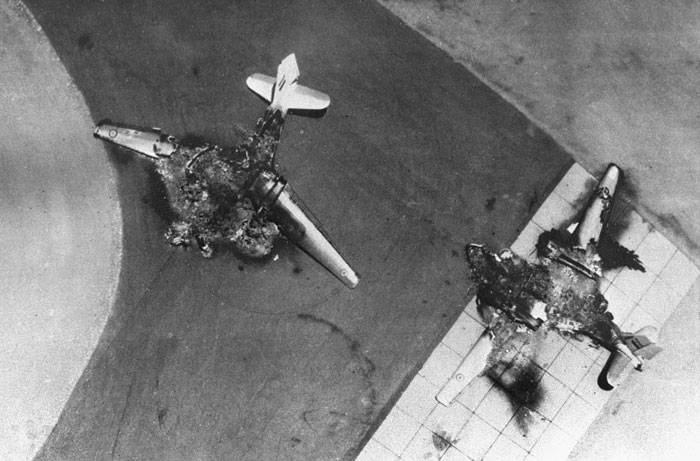
Israel Defense Force would not defeat Arabs army without the aid of aircrafts. First and foremost, early salves of air attacks cannot be underestimate. By destroying enemies landing strips in the early part of the fight, the Arabs could not retaliate, because they were unable to lift their machines. What Israel Air Force additionally did was isolating battlefield, paralyzing Arab high commands and turning retreat into rout. Firstly, IAF prevented Egyptians reserves in participating in battle. As Israeli reigned “upper area”, Jewish aircrafts constantly bombarded any additional units dispatched by Egypt, Syrian or Jordanian onto battlefield. Moreover, there was no hindrances for Israeli reserves to participate, therefore Jewish advantage was constantly increasing.
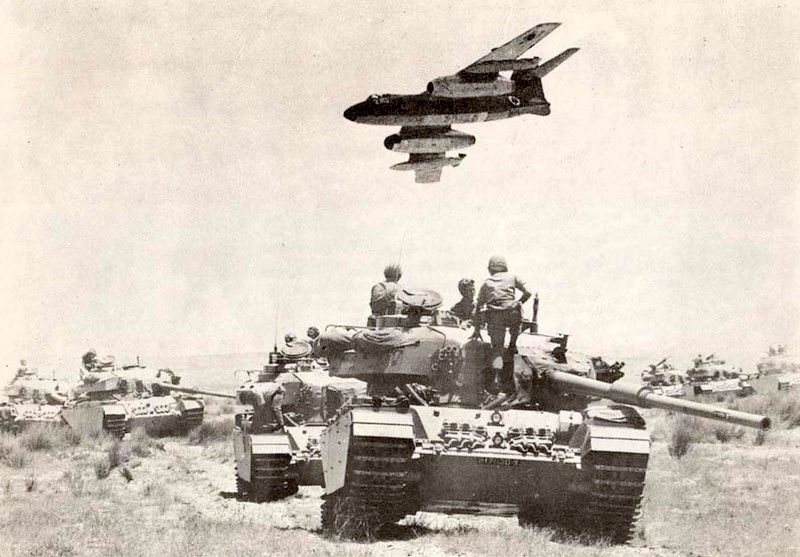
Secondly, the damages inflicted in the early stage by Israel Air Force paralyzed Arabs High Command, as they were stunned due to the vast blow to their Air Force. They were almost out rightly deprived of retaliation option, following the fact that most of landing strips were completely turned to debris. Kenneth Pollack quotes Anwar Sadat:
I went into Amer’s (Egyptian Minister of Defense – red.) office to find him standing in the middle of the room, looking about with wandering eyes. ‘Good morning,’ I said, but he didn’t seem to hear me. I said ‘Good morning’ again, but I took him a minute to return my greeting. I immediately realized something had gone wrong. I spoke to those present and was told that our air force had been completely destroyed on the ground.
Last but not least, Israeli Air Force constant bombardment of Arab retreating units, caused the psychological and physical damages, as retreats were resemblance routs. Israeli airstrikes against Arab reserves invariably delayed, halted and occasionally either scattered or routed units, who retreated following the defeat on the front. So decision of attacking Arabs reserves had two benefits: Preventing additional, supportive units to participate in battle and to destroy enemies scattered troops.
Contrary to popular believes, although very important, air force was not decisive factor in the Israeli victory in the war. The most prominent reason is obvious. Although Israel Air Force substantially supported ground troops, it is the infantry which won by capturing enemies land.
In „Six-Day War” the main objective of each side of the conflict was the conquest of enemy territory. It can be only done by infantry. Therefore, it is the most important reason why Israel Air Force was not the most crucial factor of Jewish victory. Despite its effectiveness, especially in the early part of the conflict, aircrafts are unable to conquer territory. This is significant reason, as the great legends created around Israel Air Force and its contribution to 1967 war are a bit exaggerated. Because, without the great efforts, put in by ground troops and its tremendous competitiveness, the outcome of both wars would be substantially different.
1973 – Jom Kippur War
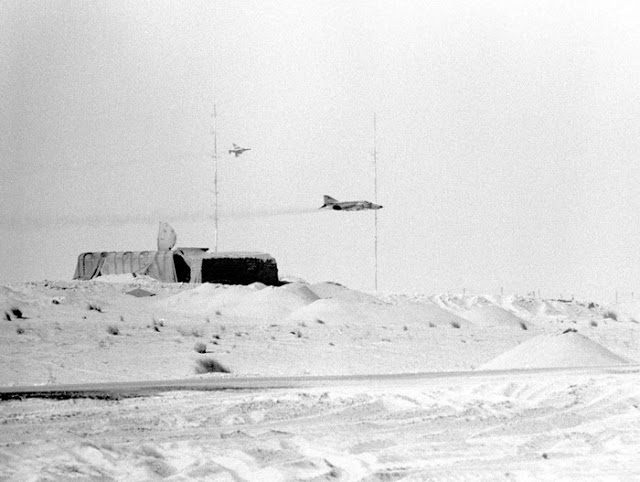
The War of 1973 was not as successful as “Six-Day War”. Arabs learned a lesson from previous war, therefore Israel faced greater resistance.
Firstly, Egyptian equipped themselves in newest anti-air guns. Egyptian soldiers were in possession of 5,000 man portable SA-7 air defense missiles as an addition to sophisticated, fixed area air defenses around the Suez Canal, build around an effective SA-2 missile. Syrian air defenses employed SA-2, SA-3, SA-6, and SA-7 missiles and many air defense guns. Egypt and Syria mostly relied on artillery and rockets rather than on aircrafts, therefore Egyptian Air Power did not made significant contributions to the outcome of main battles, as they were not main focus point in Arabs offense. Egyptian pilots soon learned not to venture beyond the range of Egyptian SAM due to the relentless attacks by Israel Air Force.
Generally, The Arabs were significantly richer of experience, better armed and trained, that made the fight more equal. Following the first clashes, Jewish aircrafts were dispatched on Sinai and around Suez in order to destroy Egyptian planes. Very few Arabic aircrafts were destroyed on the surface, due to the newly built shelters, which provided security from any bombs. That is why, the first major benefit of air force was useless this time.
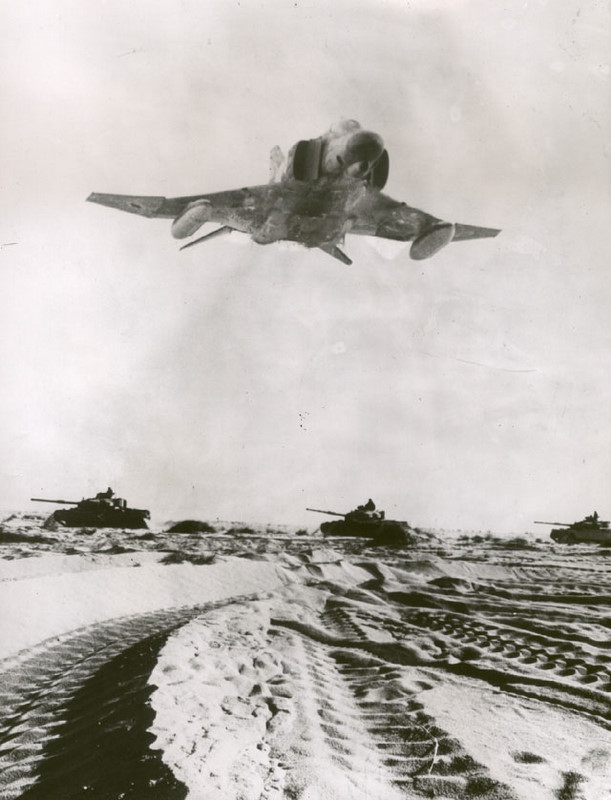
Nevertheless, Israel had sophisticated and skilled pilots with superior experience, therefore Egyptian pilots did not have any chance in direct clashes. So Israel managed to gain air superiority, yet with substantial losses. This allowed Israeli to win this war. As Arabs had the advantage of surprise, the Israeli infantry could not react as fast as planes. Therefore, due to the absence of awareness about the attack among Israel Defense Force it was the Israel Air Force who firstly retaliated on Syrian and Egyptian surprised invasions. This provided the IDF for a little breath and reassure the situation using the ground troops.
In conclusion, both wars depicted how crucial is the Air Power for countries around and within the Middle East. In the case of Israel, the major part of their offense was focused on Air Force. Therefore, thanks to those efforts Israel was able to draw the victory on its side. Of course, it should not be forgotten, that Israeli ground troops captured the lands, and many clashes were won during the absence of IAF, nevertheless infantry would be crashed by more numerous Arabic armies. Only aircrafts were capable of reducing the Arabs chances, before the major battles and after them.
Max Rud
Based on an IB essay on the topic: „Assess importance of the air power as a factor of the Israeli victory in the War 1967 and in the War of 1973.”